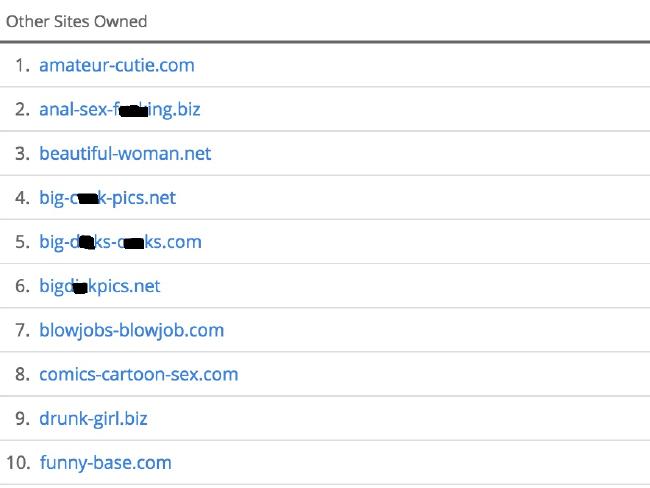
The Funny Games website looks innocent enough, but look a little deeper and it’s every parent’s worst nightmare.
UNSUSPECTING children are being lured to play explicit, animated sex games through a website that purports to be a children’s gaming site.
Designed to attract children with bright, multicoloured banners and childlike wording, the Funny-Games.biz/ main page looks like any child’s gaming site.
Listed as Google’s top site when searching for funny games, the site encourages children to play with friends. More than 100 interactive Flash games are featured on the front page. From initial glances, parents would not have cause for concern.
Scroll to the bottom of the web page and every parent’s nightmare becomes apparent. Featured under the “Want More” heading, the site states there are thousands of online games including children’s games and online sex games. A hidden link embedded under “online sex games,” links directly to the adult content.

Under the ‘want more’ tab is a hidden link for online sex games.Source:Supplied
These sex games feature graphic sexual scenarios, all accessible for children to play. Links and adverts for real-life pornographic content pop-up within this area.
Take a stroll through the forum section, linked from the main page and it quickly becomes apparent this forum has also been used for grooming children. Headings titled “Homework Help” appear innocent enough, but closer inspection reveals sinister undertones throughout the forum.
Posts such as “Like Young Boys”, state the writer has swapped many pictures with young boys online. The same thread creator has posted similar child-sex related forum posts. Administrators blocked the forum from accepting new users and comments in mid-2015, however the posts are still readily available.
Web developer Daniel Van Leeuwen, from Lion Websites in Sydney, searched the history of the Funny-Games.biz website, finding it has been operating since 2004.
“There is evidence that this website was set up originally with the intent of combining children’s games and adult sex games within the one site,” said Mr Van Leeuwen.
The identity of the Funny-Games.biz website owners is concealed, but Mr Van Leeuwen found the registrant information directed to a company operating as Moniker Privacy Services LLC, based in the United States. We contacted the company for a comment, but did not receive a response.
Nine out of 10 other sites owned by the Funny-Games proprietor are adult sex sites. A web analytic search found the amount of people looking at this site from schools is much higher than for the general internet population.

The other sites owned by Funny-Games.Source:Supplied
Mother of two pre-teen boys, Charlotte McCarthy, says her sons are avid gamers. She normally oversees what her boys are playing online, but said she could easily be fooled to think the site was OK for her boys to use.
“The link is less obvious than I thought, but the porn is only one click away, which is frightening ... It’s deceptive, dangerous and malicious … the kids could click on a link that takes them to another world that is entirely inappropriate for them,” said Mrs McCarthy.
Senior clinical psychologist and director of The Resilience Centre, Lyn Worsley, said parents had good reason to be concerned about gaming sites like this one.
She said pornography takes away children’s innocence and normalises behaviour that is not normal for children.
Dr Worsley said the games on this site advocate rape and male dominance, giving children a sense that that conduct is OK.
She said games showing pleasure and pain as if it is OK, are confusing for a developing child, who is learning to read people’s emotions.
“They don’t always understand what the right emotion is … With the heightened use of internet gaming, we are seeing a lot of children coming out with Asperger’s behaviour; they are not able to read emotions and what people’s faces are telling them,” Dr Worsley said.
If children are found to have stumbled across this type of site, Dr Worsley said parents need to be ready to have an explicit sex talk with their child and not just tell their child off for accessing the site. She said parents need to express the notion of dominance and people’s rights to their own body.
“You have to go through an open conversation about what might happen if someone clicks on these things,” she said.
“You have to explain that it’s not OK and that they are not allowed to touch other people’s bodies, unless they have permission.”
Preparing your children to be internet savvy is a way of protecting them from being groomed.
Dr Worsley says when she clicked on this site, she was asked to give her name and then told off when she didn’t do as instructed.
“A child would think, ‘I’m going to get into trouble’, so they better put their name in,” Dr Worsley said. She said it would have been very easy to talk to someone, especially as there is a private message feature within this site.
Professor Elizabeth Handsley, president for the Australian Council on Children and the Media, advises parents to stick to tried and tested sites that are connected to brands they know and trust. “Don’t just look at sites and say, ‘Yes they are all right’. Think really hard before giving your child a mobile device with internet access,” she said.
Parents should allow devices based on a negotiated deal in which the parent still gets to see the history and has access to all the device passwords.
“That way the parent can keep tab on what the child is doing,” Prof Handsley said. “It’s the parents that need to set the terms of their child’s interaction with the device or website.”
Prof Handsley suggests families enter into an online safety contract, that outlines the rules for the children using the internet. She said these contracts are available online for parents to download or use as a base to design a contract that suits their own family.
The Children’s eSafety Commissioner provides a parent advice portal called IParent. The government portal suggests parents can help protect their children and minimise exposure to damaging content, by implementing online safeguards and parental controls. Links to trusted internet filtering software are available under the Online Safeguards tab. Parents who find offensive or illegal content can report it anonymously at www.esafety.gov.au







